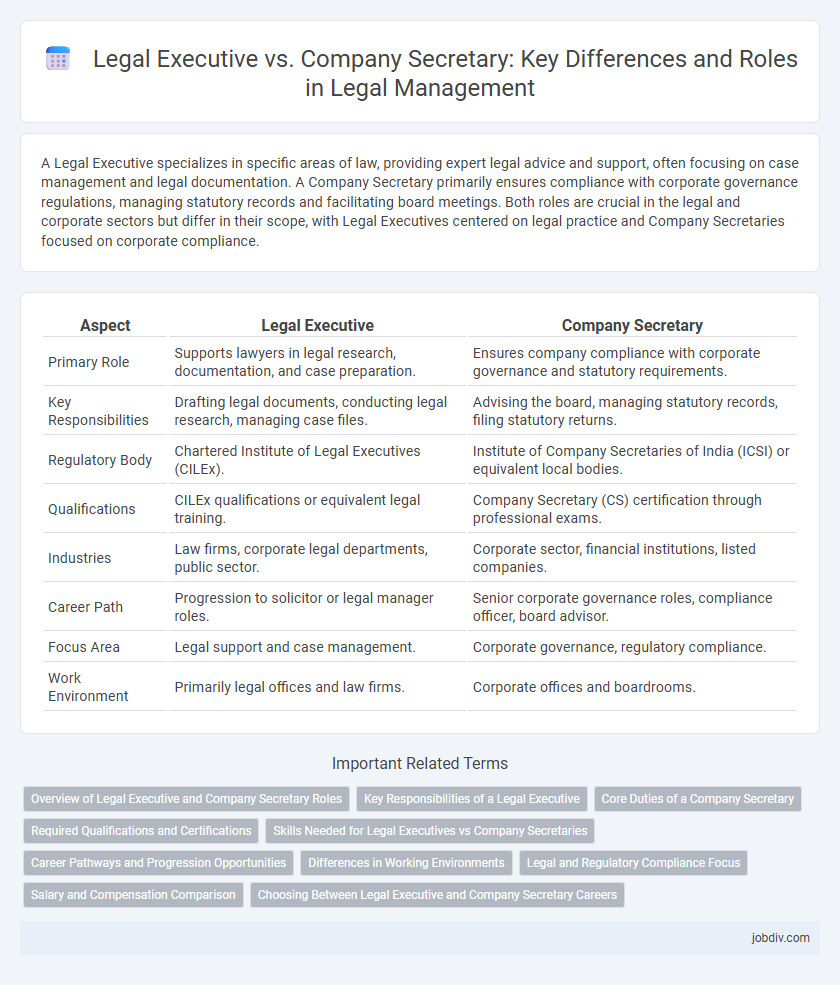A Legal Executive specializes in specific areas of law, providing expert legal advice and support, often focusing on case management and legal documentation. A Company Secretary primarily ensures compliance with corporate governance regulations, managing statutory records and facilitating board meetings. Both roles are crucial in the legal and corporate sectors but differ in their scope, with Legal Executives centered on legal practice and Company Secretaries focused on corporate compliance.
Table of Comparison
| Aspect | Legal Executive | Company Secretary |
|---|---|---|
| Primary Role | Supports lawyers in legal research, documentation, and case preparation. | Ensures company compliance with corporate governance and statutory requirements. |
| Key Responsibilities | Drafting legal documents, conducting legal research, managing case files. | Advising the board, managing statutory records, filing statutory returns. |
| Regulatory Body | Chartered Institute of Legal Executives (CILEx). | Institute of Company Secretaries of India (ICSI) or equivalent local bodies. |
| Qualifications | CILEx qualifications or equivalent legal training. | Company Secretary (CS) certification through professional exams. |
| Industries | Law firms, corporate legal departments, public sector. | Corporate sector, financial institutions, listed companies. |
| Career Path | Progression to solicitor or legal manager roles. | Senior corporate governance roles, compliance officer, board advisor. |
| Focus Area | Legal support and case management. | Corporate governance, regulatory compliance. |
| Work Environment | Primarily legal offices and law firms. | Corporate offices and boardrooms. |
Overview of Legal Executive and Company Secretary Roles
Legal Executives specialize in specific areas of law, providing expert advice, drafting documents, and representing clients under the supervision of solicitors. Company Secretaries manage corporate governance compliance, ensure adherence to statutory and regulatory requirements, and facilitate board meetings and shareholder communications. Both roles are essential in the legal and corporate sectors, with Legal Executives focusing on legal practice and Company Secretaries emphasizing corporate administration.
Key Responsibilities of a Legal Executive
Legal Executives primarily handle drafting legal documents, conducting research on legal precedents, and assisting solicitors in case preparation. They offer specialized expertise in areas such as conveyancing, litigation, and family law, ensuring compliance with relevant legislation. Their role is distinct from Company Secretaries, who focus on corporate governance, regulatory compliance, and shareholder communication.
Core Duties of a Company Secretary
The core duties of a Company Secretary include ensuring compliance with corporate governance laws, maintaining statutory records, and facilitating board meetings and resolutions. They play a crucial role in advising the board on legal and regulatory requirements, overseeing company filings, and handling communication with regulatory authorities. Company Secretaries also manage shareholder relations and ensure adherence to the company's articles of association and relevant legislation.
Required Qualifications and Certifications
Legal Executives typically require a diploma or certification from a recognized legal body such as the Chartered Institute of Legal Executives (CILEx), with progression to membership through assessed practical experience. Company Secretaries often hold professional qualifications from institutes like the Chartered Governance Institute (CGI) or the Institute of Chartered Secretaries and Administrators (ICSA), emphasizing expertise in corporate governance and compliance. Both roles demand specialized certifications, but Legal Executives focus on legal practice qualifications, while Company Secretaries require credentials in governance, company law, and regulatory compliance.
Skills Needed for Legal Executives vs Company Secretaries
Legal Executives require a strong foundation in legal research, contract drafting, and litigation support, emphasizing analytical thinking and attention to detail. Company Secretaries must excel in corporate governance, regulatory compliance, and stakeholder communication, showcasing skills in risk management and strategic advisory. Both roles demand proficiency in legal documentation, but Company Secretaries prioritize board management and statutory reporting expertise.
Career Pathways and Progression Opportunities
Legal Executives often progress by gaining specialized legal qualifications and experience in areas such as conveyancing or probate, leading to roles like senior legal executive or solicitor with further study. Company Secretaries typically advance through certification with bodies like the Institute of Chartered Secretaries and Administrators (ICSA), moving into senior governance, compliance, or board advisory positions. Both career pathways offer progression into leadership roles, but Legal Executives focus more on legal practice while Company Secretaries emphasize corporate governance and regulatory compliance.
Differences in Working Environments
Legal Executives typically work within law firms or corporate legal departments, handling litigation, conveyancing, and probate matters. Company Secretaries operate primarily in corporate settings, ensuring compliance with statutory and regulatory requirements and managing board meetings. The Legal Executive's environment is often case-driven and client-focused, while the Company Secretary's role is governance-oriented with direct interaction with company directors.
Legal and Regulatory Compliance Focus
Legal Executives specialize in providing expert legal advice, preparing legal documents, and handling litigation tasks with a strong emphasis on regulatory compliance across various industries. Company Secretaries focus on ensuring corporate governance adherence, managing statutory filings, and maintaining compliance with company law and regulatory frameworks specific to corporate entities. Both roles are critical in mitigating legal risks, but Legal Executives often engage more directly with substantive legal issues, while Company Secretaries ensure procedural and statutory compliance within corporate settings.
Salary and Compensation Comparison
Legal Executives typically earn a median salary ranging from $55,000 to $70,000 annually, while Company Secretaries command a higher compensation bracket averaging between $70,000 and $90,000, reflecting their broader governance responsibilities. Salary variations depend on factors such as industry, experience, and geographic location, with Company Secretaries often receiving additional benefits linked to corporate governance expertise. Both roles may offer bonuses and performance incentives, but the strategic nature of Company Secretary duties generally results in a more lucrative overall compensation package.
Choosing Between Legal Executive and Company Secretary Careers
Choosing between a Legal Executive and Company Secretary career depends on your interest in corporate governance versus specialized legal practice. Legal Executives focus on providing legal advice, drafting documents, and handling litigation under the supervision of solicitors, while Company Secretaries manage compliance, statutory filings, and board governance for organizations. Evaluating your strengths in legal analysis or corporate administration will guide the best professional path.
Legal Executive vs Company Secretary Infographic

 jobdiv.com
jobdiv.com